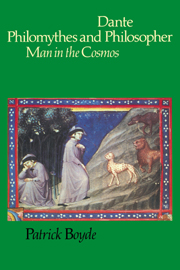Summary
The scope and influence of Aristotle's meteorology
like ‘physics’, ‘meteorology’ is one of many ancient and medieval terms to survive in modern usage with a different and much restricted range of meaning. Aristotle has very little to say about ‘meteors’ in the four books of his Meteorologica, and his subject is a good deal wider than the ‘weather’. For him, as for his predecessors, meteorology takes in all the transient phenomena which are caused by the action of Heat and Cold and which involve no more than the transformation of the ‘simple bodies’ one into another. Within his system of thought, it occupies an essential place between the study of the four elements as such, and the study of the compounds of the elements as they are found in minerals, plants and animals.
Apart from its intrinsic importance, there are two main reasons why the subject demands a separate chapter at this point. First, it was from meteorology that Dante drew much of the matter and imagery for two of the canzoni that he wrote to express his love for a hard-hearted ‘lady of stone’. These poems are not only superb achievements in their own right, they are the earliest true forerunners of the Comedy. Here, for the first time, as he wrestled with the data of meteorology, Dante's poetry became simultaneously learned, concrete, passionate and technically daring.
- Type
- Chapter
- Information
- Dante Philomythes and PhilosopherMan in the Cosmos, pp. 74 - 95Publisher: Cambridge University PressPrint publication year: 1981



